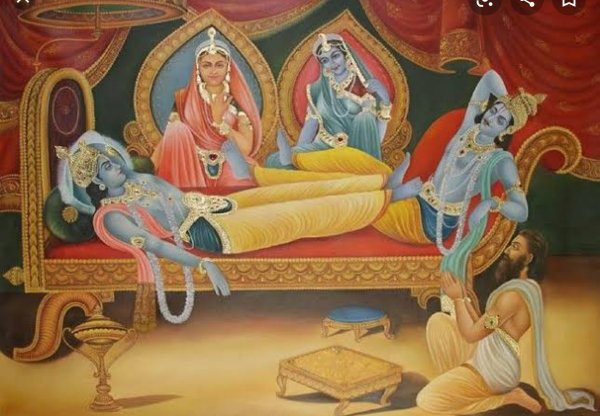Draupadi Sathyabhama Parva is the thirty eighth upa parva included in the third maha parva, named as Vana parva or Aranyaka parva in the epic Mahabharata. The original epic was composed by Vyasa in Sanskrit. Vyshampayana had narrated to Janamejaya the historical events, happened in the forests on his queries.
In this upa parva, mainly the conversations between Draupadi and Sathyabhama are narrated and hence it is also named as Draupadi Sathyabhama Samvada parva.

Who was Sathyabhama and what was Syamanthaka Upakhyana?
Sathyabhama was the daughter of Sathrajitha. Sathrajitha had three daughters and Sathyabhama was the eldest one. Sathrajitha belonged to Yadava lineage and was the chief of the treasury of Dwaraka. Prasena was his brother.
Sathrajitha was the custodian of the famous gem Syamanthaka Mani. One day, Krishna told Sathrajitha to hand over the Syamanthaka Mani to him and he would keep it safely with him. Sathrajitha had denied giving the gem to Krishna. Later one day, his brother Prasena had gone to the forest for hunting wearing the Syamanthaka gem but in the forest, Prasena was killed by a lion. Jambava was living in the same forest and he was running an orphanage. Jambava had killed the lion and got the Sayamanthaka gem but he gave it to his daughter, Jambavathi.
When Prasena had not returned to Dwaraka, a bad news was spreading against Krishna since he was once interested to procure the gem Syamanthaka Mani. In order to prove his innocence, Krishna had moved to the forest with his kinsmen in search of Prasena and found Jambavathi. As Jambava could not recognize Krishna, a war was fought for twenty eight days between them and finally Krishna appeared as Rama to Jambava and immediately Jambava had surrendered to him.
Jambava had given his daughter Jambavathi in marriage to Krishna with the gem Syamnthaka Mani. When Krishna reached Dwaraka with Jambavathi, he had returned the gem to Sathrajitha and then Sathrajitha felt very sorry for the past events. In order to please Krishna, Sathrajitha had given his three daughters to Krishna in marriage with the gem Syamanthaka Mani.
Krishna had accepted Sathyabhama with her sisters as wives but he again returned the gem Syamanthaka Mani to Sathrajitha and later it was stored in his treasury as the state wealth. These incidences were told as Syamanthaka Upakhyana. Sathyabhama had lived with Krishna as his wife. She visited Pandava brothers at Kamyakavana with Krishna.
What were the main conversation items between Draupadi and Sathyabhama?
Sathyabhama had secretly asked Draupadi whether she was using any sorcerer powers to live with the five Pandava brothers together and she desired to know about the routine style of life of Draupadi and Pandavas.
Draupadi advised Sathyabhama never to use sorcerer methods to live with husband. One should be sincere in all works in the family matters. Ladies should live in truthful methods for a better family life. She told she was serving her mother-in-law Kunti treating her as own mother. Draupadi told she was keeping the premises neat and clean. She was taking special care about the food items and dress materials for the upkeep of health of her five husbands.
Then Sathyabhama assured Draupadi about her children’s education, health and activities in the Dwaraka palace. All her children, Prathivindhya, Shruthasoma, Shrutakarma, Shatanika, and Shrutasena were playing with Abhimanyu as brothers. Subhadra was looking after them and Krishna was the tutor for them.
What was the Savithri Upakhyana as told by Markandeya Rishi?
Markandeya Rishi started the story of Pathivratha Savithri when Draupadi and Sathyabhama were engaged in their private conversations. Dyumatsena was a king who belonged to the Shalva lineage and Saibya was his queen. When they had a small child called Satyavan, Dyumatsena was attacked by his enemy and driven into the forests. Saibya had carried her child, Satyavan, also into the forests and they had started their forest life. With the help of Rishis like Gauthama and Dalbhya, Satyavan had got his education but then Dyumatsena had become a blind man. They continued their life in the forest within the company of Rishis.
Ashvapathi was a king who belonged to Madras and Malava was his queen. When they had married, they had donated huge quantities of gold and gems to the learned humble Brahmins. Ashvapathi was aggrieved, since even after many years, he did not have a child. As per the advice of the humble Brahmins, Ashvapathi and Malava started the fast, called as Savithri Vratam, to get a good child. After a year of observing the fast, Malava had been blessed by the Gods with a female child and the learned Brahmins had named her as Savithri. With their help, Savithri had got her education but then Ashvapathi had worried about conducting her marriage. They continued their search in the entire world, but could not get a proper prince for Savithri.
Later, Ashvapathi, the King of Madra, had arranged a troop and sent his daughter with that troop as her body guards for searching and selecting her own husband. After searching the entire capitals of various countries, they got tired but could not get a suitable bridegroom for Savithri. One day, Narada Rishi had visited the palace of Ashvapathi and his daughter Savithri had then returned there and reported to her father as follows.
Satyavan, the son of Dyumatsena possessed good characters but he lived with his parents in forests with the company of ascetic Rishis. It was heard by Narada Rishi and he warned Ashvapathi regarding the deficiencies in the horoscope of Satyavan. Narada Rishi told Ashvapathi regarding the life span of Satyavan and told he would live only for a few months and Yama would visit him to grab his life on the next Jeshta month no-moon day.
Savithri heard the message and boldly told her father she could face any kind of situations but she had decided to marry Satyavan as her husband. Ashvapathi with his court priests and Malava carried Savithri to the forest and met with Dyumatsena and requested with him to accept his daughter as his daughter in law by approving the marriage of Satyavan.
Finally, all the people agreed for the proposal and the wedding of Satyavan with Savithri had been conducted in the forest with the presence of Rishis as guests. When they had married, Ashvapathi had again donated huge quantities of gold and gems to the learned humble Brahmins, and later returned to his capital Madra. Savithri started her forest life serving the blind father-in-law, Dyumatsena and husband Satyavan sincerely. She was very cautious about the Jeshta month and decided to recite the Savithri Manthras twice a day. She started Savithri Vrata (fast) three days prior to the no-moon day.
On the Jeshta month, Amavasya day morning, after reciting the Savithri Mantras as usual, Savithri desired to accompany her husband, Satyavan when he started to go out to collect fruits and wooden logs for rituals and house hold routine use. The forest path was not accustomed to her but she coped with her husband enduring the sharp stones and thorns enrooted.
After midday’s meals, Satyavan felt dozy and desired to sleep under a tree. He started sleeping but the lord of death appeared on his bison approaching him. He casted his coiled rope and pulled the life of Satyavan and started on his bison towards south but Savithri followed walking behind him.
The lord of death, Yama told her to return to the hermit and conduct after rituals with her father in law and need not follow him. But she believed in her strong devotions and Savitri Mantras and she gained ascetic powers. Yama again told her to ask any boon except the life of Satyavan. She asked him to provide the eye sights to her father-in-law Dyumatsena, for which he agreed but she continued to follow him.
Yama again told her to ask any boon except the life of Satyavan. She asked him to provide back the lost kingdom, to her father-in-law Dyumatsena, for which he agreed but she continued to follow him. Yama requested her to return, again told her to ask any boon except the life of Satyavan. She asked him to provide a child to her father, Ashvapathi, who would live for hundreds of years possessing good characters, for which he agreed but she continued to follow him reciting the Savithri Manthras. Yama requested her to return, and again told her to ask any boon except the life of Satyavan. She asked him to provide a child to her who would live for hundreds of years possessing good characters, for which he agreed but she continued to follow him reciting the Savithri Manthras.
Savithri praised Yama as the lord of justice with name Vaivasvata and he was in possession of celestial great powers and she assured in every year on that day of Jeshta Amavasya, she would observe Savithri Vrata and recite Savithri Manthras. She requested Yama to follow his own rules of rebirth but instead of providing his life into another fresh young body, let him pierce his same life into his old one as rebirth. Then Yama thought and told her he was pleased to give him rebirth in his old body of Satyavan.
Yama blessed her to live following Sanatana Dharma as he had already agreed with her to bless them with a child. Then she returned after saluting him and reached near the body of Satyavan. He got up from his sleep and then they hurried to the Ashram with fruits and logs of wood.
When they had reached their Ashram, Gauthama Rishi told her the eye sight of Dyumatsena had been restored. Savithri had observed her Savithri Vratha (fast) that day since it was Jeshta Amavasya day. On the following day, people from his kingdom had come searching for him and told him his enemy was slain by his own minister and Dyumatsena with queen and prince requested to take charge soon.
On their return, Dyumatsena had crowned Sathyavan as the king. After a few years, they received news as Ashvapathi had got a child at Madra. Later, Satyavan and Savithri also got a child, and when he had grown up, he ruled their kingdom.
नास्य किं चिदविज्ञातं नास्य किं चिदकर्मजम् । न स किं चिन्न विषहेदिति कृष्णममन्यत ॥
Meaning: There is nothing in this world which is not known to Krishna, there is no result which is unknown to Krishna that is born out of any actions, and there is nothing which he never endured. Vyasa had written about Krishna as the knower of all.
Later, Sathyabhama had returned with Krishna to Dwaraka from Kamyakavana.
On reading this story, children would gain more memory power.
Next post, Mahabharat: Ghoshayatra would be more interesting.
Mahabharat: Mrigasvapnobhava would be presented separately in another article.
It is humbly prayed for the blessings of God Krishna upon us.
Readers may share this story with children, friends and family.

0 Comments
1 Pingback